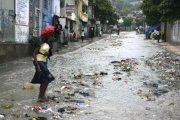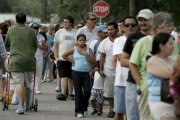
Haiti (MNN) — Haiti's situation
continues to grow more desperate. Four major storms in rapid succession struck
the island nation, flooding out the roads and fields, and destroying the crops.
That will worsen an already critical food crisis. Standing water and closed
hospitals are another concern.
Two million dollars is on its way
to temporarily fix bridges so emergency supplies can be trucked into hard-hit
villages. The United States pledged $20-million to help with rebuilding, food
and medicine.
The storms killed at least 300
people in Haiti, and of those affected, 52% are estimated to be women and 36%
children. Elderly people and pregnant women are among the most vulnerable
needing care.
However, few medical facilities
were able to remain open. Those that
could are running critically low on supplies and can't replenish them because
of the impassable roads. Add to that standing
water, and there is a growing concern over water-borne diseases and festering
injuries that could lead to a second wave of disaster.
Sonny
Enriquez with
International Aid is coordinating relief programs with several faith-based groups in
Haiti. So far, they've sent $250,000 worth of help. "We're working through a number of
partner agencies on the ground. We're primarily working in the health sector,
trying to prevent the spread of infectious diseases. So far, we've sent 5,000 hygiene kits."
They're also raising funds to
provide HydrAidTM BioSand Water Filters and the Lab-in-a-Suitcase which contains
basic laboratory instruments for blood and urine analysis. This
portable kit can also function without electricity, using power-producing solar
panels.
Despite all the response with
supplies, that's not all International Aid is doing. The local church is also a
big part of the recovery effort.
Enriquez says church partners
will bring more than physical assistance: they'll bring the Gospel.
"People in need are clinging onto something that could provide them real
life support. As things start to become normal, they start searching and asking
themselves, 'What has happened to me?' 'What's next?' 'Where will I move?' This is where the message of hope comes in
and the message of healing."

